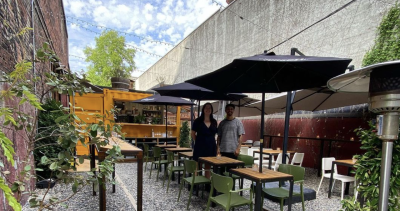“Aitamaako’tamisskapi Natosi: Before The Sun” highlights the importance of sharing Indigenous joy
Aitamaako’tamisskapi Natosi: Before The Sun opens with Logan Red Crow riding. It’s the thing the young Siksika woman does most through the feature-length documentary: cling to horses, bareback, free.
The documentary, deftly directed by Nuxalk filmmaker Banchi Hanuse, follows Red Crow as she gets deep into the world of Indian Relay racing, where riders jump off their horse and rapidly mount a new one after each lap.
It’s often considered one of the most dangerous horse races on earth. Red Crow throws herself in, heart and soul, with the support (and concern) of her father Allison, himself an accomplished horseman with his own racing team.
For executive producer Carey Newman (Hayalthkin’geme)—an artist with Kwagiulth, Coast Salish, and settler ancestry, who is best known for his residential school-memorializing work The Witness Blanket—the film offered the opportunity to tell a different kind of story.
“I have a daughter who’s 13 years old. I think there’s not enough stories about strong Indigenous women out there,” he says over a video call. “I instantly connected with it and I wanted to support seeing it made.”
It was Newman’s first time executive producing a film, and he saw his role as staying in the back to ensure everyone got what they needed. He was also the only Indigenous producer on the team, describing himself as “the mysterious Indigenous person in the background.” Part of his job involved making sure filming in different communities wouldn’t cause issues, as much of the production took place during the height of the Covid pandemic.
“We were coming into smaller communities. We really didn’t want to bulldoze our way through what a community’s level of comfort was,” he says. “My role was having, sometimes, difficult conversations with the funder…because it’s not going to be the same story if we’re doing it under duress.”
There’s a classic sports doc arc to the narrative: three big events, each one with downtime and preparation, culminating in heart-racing action sequences.
But the film deftly balances a number of topics. There’s Red Crow’s bonds between specific horses, who she speaks to non-stop; the realities of travelling to Enoch Cree Nation, Alberta and Casper, Wyoming to race; the love between her parents and her brother and the ways they support her dreams; and her fiercely competitive nature, exacerbated by her role as one of the only women in a male-dominated sport.
“What grabs you is: if this was a story about horse racing, that would be one thing; if this was a story about the complexities and nuances of public life, that would be another thing,” Newman reflects. “But [Hanuse] really found a way to bring all of these together.”
Red Crow was the first woman to ride Indian Relay at the Calgary Stampede, although her experience wasn’t ideal. But that pushed her to be better, and Aitamaako’tamisskapi Natosi charts her progression as she trains relentlessly to improve.
It’s focused on a specific experience—rooted in Siksika Nation, and in the wider tradition of Plains-dwelling Nations working with horses—and yet, like all good documentaries, it also taps into universal themes.
“Being an Indigenous story, of course there’s the reality of colonialism. But it doesn’t take over,” Newman says. “The focus is on the love and the strength and perseverance.”
Between the beautiful cinematography, Red Crow’s hope and determination is infectious. She’s driven not to win, necessarily, but to be the best version of herself that she can—to be a rider worthy of her horses. There’s a power in sharing that.
“These stories are equally, if not more important for those who have experienced the trauma. We don’t need to see it over and over. I don’t need to watch documentaries that outline the horrors of residential schools: we’ve lived it, in my family,” Newman says. “I’d rather see films that show what comes next—that show that joy.”
Aitamaako’tamisskapi Natosi: Before The Sun at the Vancouver International Film Festival
October 7: 6:15pm, International Village
October 8: 4:15pm, Studio Theatre















Comments